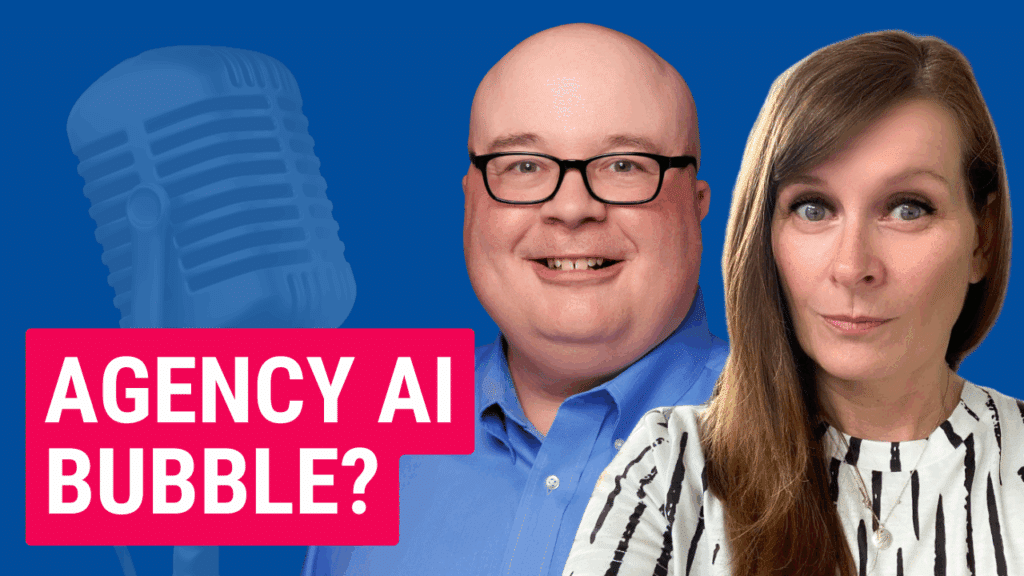Avoiding your agency’s own AI bubble
Description

<figure class="wp-block-embed is-type-video is-provider-youtube wp-block-embed-youtube wp-embed-aspect-16-9 wp-has-aspect-ratio">
In this episode, Chip and Gini discuss the impact of AI on small agencies, focusing on the high expectations and possible disappointments it poses. They reference a recent article from The Atlantic, which highlights a study showing that AI can sometimes decrease efficiency.
They caution against overhauling business models based solely on AI’s current capabilities, stressing that while AI can assist with tasks and improve efficiency, it cannot fully replace human judgment and creativity.
The conversation extends to the challenges of integrating AI without sacrificing the development of new talent and ensuring that the evolving role of AI adds value rather than causing disruption.
Key takeaways
- Chip Griffin: “It’s not about AI being either the panacea or evil, it’s that we may be adjusting our models too much too quickly.”
- Gini Dietrich: “AI is great for some things but it cannot replace human beings yet.”
- Chip Griffin: “It is incredibly likely that all of the providers of AI are going to start ratcheting up the prices. And so what looks today like a huge cost savings likely may not be in just a few short years.”
- Gini Dietrich: “How do we bring new college graduates into the workforce, and what are we teaching them?”
Resources
- Just How Bad Would an AI Bubble Be? (The Atlantic)
Related
- Should AI upend your agency business model today?
- Using AI the right way for agency biz dev
- CWC 10: Neville Hobson on AI and machine learning in PR
The following is a computer-generated transcript. Please listen to the audio to confirm accuracy.
Chip Griffin: Hello and welcome to another episode of the Agency Leadership Podcast. I’m Chip Griffin.
Gini Dietrich: And I am Gini Dietrich.
Chip Griffin: And Gini, I think, you know, I think AI is gonna solve all of my problems. We’ve said this before, but I, I really, I’m gonna change my whole business model around it.
Gini Dietrich: I think you should fire everybody.
You could fire me as your co-host. AI can just do it for you.
Chip Griffin: You know, I mean, I wonder if the AI would talk back less.
Gini Dietrich: Probably, although if I program it, I’ll program it for you so that it, it talks back a sufficient amount.
Chip Griffin: Excellent, excellent. Just, just what I need.
Gini Dietrich: You’re welcome.
Chip Griffin: Oh, at least, you know, maybe, maybe the AI wouldn’t yawn at me like you did just before we started recording, so
Gini Dietrich: I shouldn’t even be tired either.
I got nine hours of sleep last night. I don’t know what my problem is,
Chip Griffin: I assume you were expressing your boredom with me.
Gini Dietrich: No. Prior to the start of the show. No.
Chip Griffin: I mean, usually it takes a couple minutes for most of our listeners to get that bored with me. So
Gini Dietrich: no, I’m not bored with you.
Chip Griffin: Okay.
Gini Dietrich: Just sleepy.
Chip Griffin: Just sleepy. Well, I’m with you on that. Alright. But we are gonna talk about AI and in particular, there was a good article in the Atlantic recently, that is consistent with some of the things that I’ve been saying and talking with clients and, and I think it’s, it’s helpful to think about. And that is whether or not there is an AI bubble and what it means.
And it’s not, in my view, it’s not so much about a macro AI bubble, sort of like we think about, you know, the, the internet bubble in the early 2000s and, and I think there is certainly some of that, but that’s really more about investing in some of the businesses and infrastructure and that kind of thing.
But I think for small agencies, there is the potential for an AI bubble that comes about because we all get too focused on either what kind of threat AI is or what kind of opportunity AI is. And we’ve said before on this, we’ve talked about AI a lot, so I, I was a little reluctant to come back to it, but I think that thinking about it in in these terms may be helpful.
Because it’s not, it’s not about AI being either the panacea or evil, it’s that we may be adjusting our models too much too quickly because some of these things may not quite be there. And in particular, the Atlantic had a great example and it was from a study that was done with some software developers. And the software developers were given AI to help them do their jobs. And the purpose of the study was to try to figure out was it a 20% efficiency improvement, 40%, 60%, what was it? And ultimately what they discovered was it was actually, it decreased their efficiency.
Gini Dietrich: Mm-hmm. Mm-hmm.
Chip Griffin: Because part of the challenge with AI, and I, I’m sure many of us have seen this, is when it works well, God, it works great.
It just, and, and we’re impressed and we’re, we sit there and say, that’s amazing. But we, we don’t factor in the times it doesn’t work and the times we have to argue with it and fight. Right? And so if, if we’re go, and I, I mean I do this a lot with, I mean, maybe it shows something about me that I argue with the computer.
I was trying out Gamma recently, which is a, a service that lets you build PowerPoint decks effectively. And I threw something in, just kind of randomly grabbed an outline, threw it in, and it actually did a really nice job of creating the first thing that I sent to it. And I’m like, that’s great. I’m like, okay, well can you make these modifications to it?
And it just wouldn’t do it. It just, it, it kept, you know, I, I said, can we put, you know, my logo at the bottom of the slide, you know, in the footer. And so it puts it in, it’s like a quarter of the screen. I’m like, no, no. I said, can you make it smaller,
Gini Dietrich: same size, just move it.
Chip Griffin: And it’s like, great, that’s a great idea.
Let’s make it smaller. And it gives it to me the exact same size. Oh. And it makes it completely unusable because obviously you don’t really want your company logo to take up a quarter of the slide. That’s just dumb. So I, I think we need to, to think about all of the effort that we’re putting into AI and factor that in when we’re thinking about our own efficiencies, because I’m afraid that some people may be changing their models too much, changing their pricing too much. Because they’re looking at the successful implementation of AI and not factoring in all of the challenges along the way. At least as it exists in September of 2025.
Gini Dietrich: Gartner has their hype cycle, right? And so it looks at things from that perspective. And, you know, we get really excited. We’re human beings. We get really excited. There’s something. Coming. There’s like all this like, oh, that’s scary. We’re not gonna do anything. Then we get really excited about it. Then it dips down and then it comes back up before it’s like scalable and, and something that we use.
The internet was one, email was one, social media was another, those kinds of things. Right. Well, in the hype cycle, AI is now in the trough of disappointment. So it’s in that section of the cycle where it’s like, oh. Maybe this isn’t gonna work so well. And you have compani





